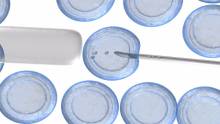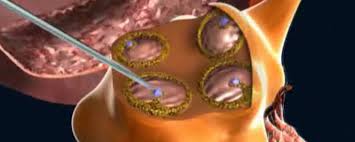Egg Donation and Egg Sharing Process
Egg donation (egg transfering) is a method suitable for women who cannot produce eggs for some reason. It is based on placing the embryo which is produced by fertilizing the eggs, taken from another individual, fit for the family , with the sperm from the father on the patient’s uterus.
Who do we suggest egg donation to?
- Women who have never had a period, however, whose uterine mucosa is intact.
- Women whose ovum (egg cells) have been damaged due to chemo or radiotherapy,
- Patients of whom none or a very tiny amount of eggs have been retrieved in previous IVF procedures,
- Those whose FSH (Follicle-stimulating hormone) levels are above 15 on the third day of menstruation,
- Patients who have had unsuccessful IVF treatments and couldn’t get pregnant,
- Women whose ovary has been removed or who have lost a significant amount of tissue due to surgical operations such as cyst removals,
- Patients with a possible risk of passing down illnesses (hereditary illnesses),
- Women who are experienceing menopause at an early age.
Women interested in egg donation can select a “known” or an “anonymous” donor.
A known donor for Egg Donation
If a woman wants to receive eggs from a known donor, the donor should be a woman at the ages of 21-30 and who doesn’t have a medical or genetic condition. Infectious diseases tests are the same for all donors, and, these tests are done in compliance with guideline standarts of the European Society of Reprductive Medicine (ESHRE) and the American Society for Reproductive Medicine (ASRM). While the donor and the recipient know each other, it is suggested that both parts sign an agreement prepared by a lawyer/solicitor.
An anonymous donor for Egg Donation
When the donor is anonymous, the identities of both the donor and the recipient are kept secret. Although anonymous egg donation is similar to sperm donation medically, present technologies do not allow freezing and storing (cryopreserving) eggs like sperm.
Of women who apply to become anonymous donors, only those who have a normal weight, do not have a medical or genetic condition and any infectious diseases (according to the ESHRE and ASRM criteria) and who are between 21-30 are accepted.
Donor selection:
- A donor can be someone known by the couple or anonymous.
- Donors should be at the age of 21-30 and not have a medical condition.
- Women who have had healthy pregnancies and given birth can become donors.
- Donors shouldn’t be of families with a history of familial mental retardation.
- Donors who have a hereditary disease or a family history of such are not accepted.
Screening tests applied to egg donors
- The donor fills in the profile form.
- Our specialist makes the first assessment and examination.
- Donors are people who have been assessed for infectious diseases (HIV, hepatitis B and C, cytomegalovirus, syphilis, chlamydia), genetic diseases (karyotype analysis and cystic fibrosis screening); their blood type and Rh factor tests have been done and those of specific ethnic background who have had thalassemia and drepanocytic anemia tests.
- Cervical culture tests are done regarding Gonorrhea, Chlamydia, Ureaplasma and Mycoplasma.
When choosing the donor, utmost care is given to match the physical features such as the color of the skin, eyes and hair and the body type and build of both the donor and the recipient as much as possible. Additionally, their ethnic origin, blood type and other physical features are tried to be kept as close as possible to the recipient couple.
* Both the donor’s and the recipient’s identities are kept confidential.
* Prior to the treatment both the donor and the recipient sign a consent form. Donors are asked to sign an informed consent form stating that their eggs will be used to produce embryos and that those will be frozen and stored.
Tests required for the recipient couple who will receive eggs from donors
- First of all, the couple is assessed and examined by one of our specialists and thei medical records are evaluated.
- The female partner is examined by our specialists in order to be sure that her medical condition is healthy.
- Rubella immunity, blood type, HIV antibody, hepatitis B and C, surface antigen, RPR for cyphilis tests are done on the female partner. Cervical culture tests are done regarding Cytomegalovirus (CMV), Gonorrhea, Chlamydia, Ureaplasma, Urealyticum and Mycoplasma Hominis.
- If not done in the last two years, hysterosalpingography and hysteroscopy is done to see if the uterine cavity is in good health.
- For the male partner, blood type, HIV antibody, Hepatitis B and C surface antigen, RPR and CMV for cyphilis tests are required.
- If not done in the last 6 months, semen analysis is also required.
Egg Donation Treatment Period:
Medication is given to the donor and the recipient so that their periods are simultaneous. As soon as the donor starts with the treatment to grow eggs, the recipient starts taking estrogen on the second day of her menstruation. Estrogen helps the intrauterine tissue, on which the transferred embryos are going to be attached, to get thicker.
This pre-treatment phase is a process which the patients can apply in their hometown/country since it involves taking pills as medication. This phase lasts for about 12 days. After this period, the patients travel to TRNC is planned and on the day the eggs are retrieved from the donor, sperm is taken from the patient’s male partner and via microinjection fertilization is started.
On the same day, the mother-to-be starts with the vaginal progesterone. Following the day of sperm collection, 3-5 days later the treatment is completed by transferring 2 or 3 embryos into the uterus.
* The total time for treatment in TRNC is 5 days.
12 days after the operation ßHCG levels are checked in blood for pregnancy diagnosis.
If the couple wishes, fertilized eggs and/or embryos which have shown a healthy growth can be frozen and stored for the couple to use in the future.
Results and success rates.
Pregnancy rates with egg donation are quite high; these are higher than the rates of pregnant couples whose own sperm and eggs are used. Such success rates are because the donors do not have any infertility related condition and because they can produce healthier eggs compared to infertile patients. Additionally, the patient’s endometrium does not encounter any hyperstimulation and thus, becomes fitter for implantation. For these reasons, usually, three donated embryos are transferred at once.
Gyneacologist surgeon specialist Mürüde Çakartaş Dağdelen and her team have a success rate of 60-70% in these types of procedures. * Note:Sperm donation, embryo donation and egg donation treatments are forbidden by law for citizens of Turkish Republic.



